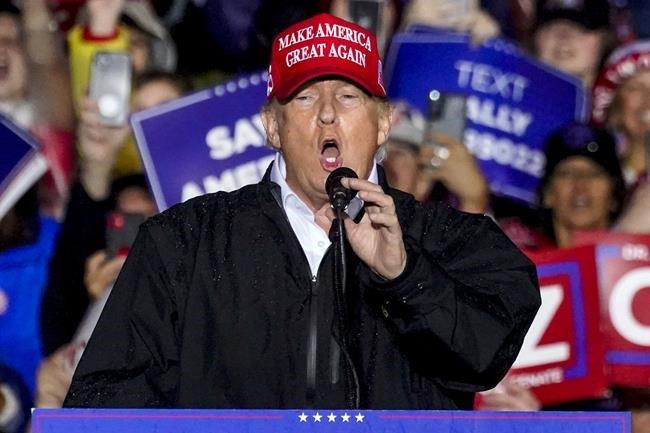NEW YORK (AP) — A federal judge on Friday dismissed Donald Trump’s lawsuit against New York Attorney General Letitia James, rejecting the former president’s claim that she targeted him out of political animus and allowing her civil investigation into his business practices to continue.
In a 43-page ruling, U.S. District Judge Brenda Sannes wrote that case law bars federal judges from interfering in state-level investigations, with limited exceptions, and that there wasn't evidence to support the Republican's contention that James, a Democrat, was proceeding in bad faith because of their differing political views.
Sannes, who was appointed in 2014 by former President Barack Obama, a Democrat, said James had a legitimate basis for investigating Trump and his company, the Trump Organization, and that Trump failed to show that recent court proceedings seeking to enforce subpoenas on him were “commenced for the purpose of retaliation.”
James' public statements about Trump “make clear that she disagrees vehemently with Mr. Trump’s political views,” Sannes wrote, but Trump and his lawyers failed to demonstrate any connection between her opinions and how the investigation has played out.
“The fact that (James') public statements reflect personal and/or political animus toward (Trump) is not, in and of itself, sufficient,” Sannes wrote.
James heralded Friday’s ruling as a “big victory” over a “frivolous” lawsuit. Sannes’ decision came a day after a New York appeals court in James’ probe, upholding a lower-court ruling requiring him to sit for a deposition.
“Time and time again, the courts have made clear that Donald J. Trump’s baseless legal challenges cannot stop our lawful investigation into his and the Trump Organization’s financial dealings,” James said in a written statement. “No one in this country can pick and choose how the law applies to them, and Donald Trump is no exception. As we have said all along, we will continue this investigation undeterred.”
Trump’s lawyer, Alina Habba, questioned Sannes’ justification for dismissing the lawsuit and said they would take the matter to the 2nd U.S. Court of Appeals.
“There is no question that we will be appealing this decision,” Habba said. “If Ms. James’s egregious conduct and harassing investigation does not meet the bad faith exception to the Younger abstention doctrine, then I cannot imagine a scenario that would.”
Trump sued James in December, resorting to a familiar but seldom successful strategy of litigation in an attempt to end the three-year investigation, which James has said uncovered evidence Trump’s company misstated the value of assets like skyscrapers and golf courses on financial statements for more than a decade.
Trump filed the lawsuit just after James issued subpoenas for him and his two eldest children, Ivanka and Donald Jr., to give deposition testimony in James’ probe.
Trump sought an injunction barring James from investigating him and preventing her from being involved in any “civil or criminal” investigations of him and his company, such as a parallel criminal probe being led by Manhattan District Attorney Alvin Bragg. Although the civil investigation is separate, James’ office has been involved in both. Trump also wanted a judge to declare that James violated his free speech and due process rights.
“We are sitting with our hands tied. We are simply dodging subpoenas at this point,” Habba said at a May 13 hearing.
Trump has long contended that the New York investigations are part of a politically motivated “witch hunt.” In the lawsuit, his lawyers alleged that James had violated his constitutional rights in a “thinly-veiled effort to publicly malign Trump and his associates.”
The lawsuit described James as having “personal disdain” for Trump, pointing to numerous statements she’s made about him, including her boast that her office sued his administration 76 times and tweets during her 2018 campaign that she had her “eyes on Trump Tower” and that Trump was “running out of time.”
James' office responded that the lawsuit was a “collateral attack” on her investigation and a “complete about-face” after Trump previously agreed to turn over his 2014-2019 income tax returns to her office and his company provided more than 900,000 documents and testimony from more than a dozen current and former employees.
Trump and his company never challenged the underlying legal basis for the investigation or the attorney general’s office’s legal authority to conduct it until her office issued a subpoena for his testimony, James’ office said.
James’ office started investigating Trump in 2019 after his former personal lawyer Michael Cohen told Congress that Trump had a history of misrepresenting the value of assets to gain favorable loan terms and tax benefits.
At a May 13 hearing that precipitated Sannes’ ruling Friday, a lawyer for James’ office said the probe is winding down and that evidence from it could support legal action against the former president, his company, or both.
The lawyer, Andrew Amer, said “there’s clearly been a substantial amount of evidence amassed that could support the filing of an enforcement proceeding,” although a final determination on filing such an action has not been made.
All of that, Amer said, “really shuts the door on any argument” by Trump’s lawyers that the James' office was proceeding in bad faith.
__
Follow Michael Sisak on Twitter at . Send confidential tips by visiting .
Michael R. Sisak, The Associated Press



